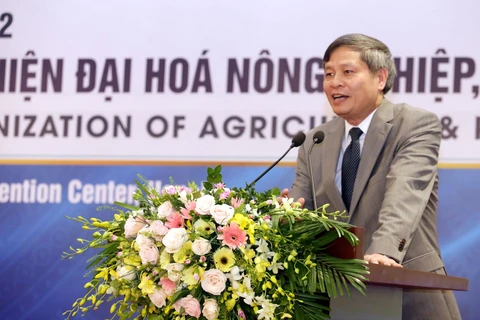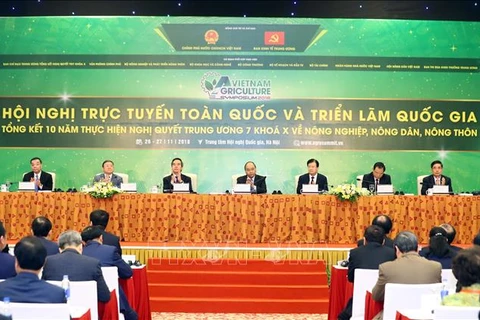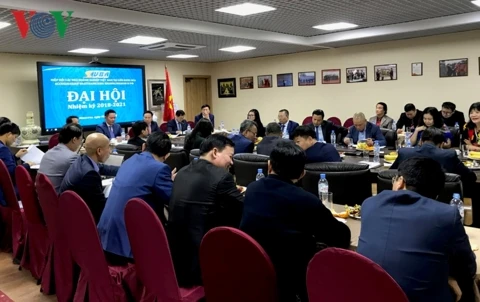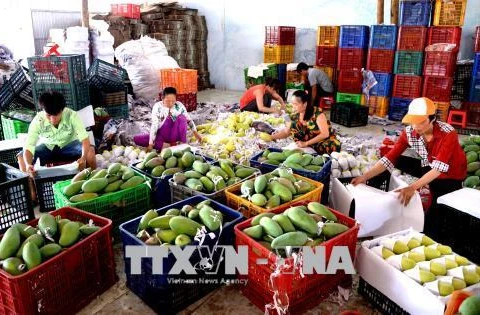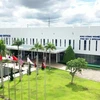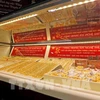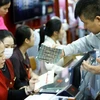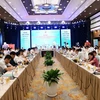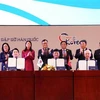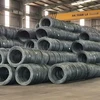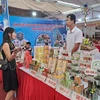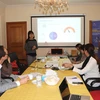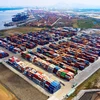Hanoi (VNA) – Vietnam holds great advantages to export agricultural products to European Union (EU) countries, whose soil is not suitable for the cultivation of tropical farm produce, experts said.
In particular, when the EU-Vietnam Free Trade Agreement takes effect, Vietnamese products will gain a competitive edge in the market as tariff lines will fall to 0-5 percent over the next seven to 10 years.
At the Vietnam-EU Trade Forum held by the Ministry of Industry and Trade’s Department of European-American Market in Hanoi on December 6, Deputy Minister Cao Quoc Hung stressed that the EU is a prosperous economic bloc, with a gross domestic product (GDP) accounting for 23 percent of the world’s economy, and an income per capita mounting to 40,890 USD.
With 28 member states, the EU’s total population reaches some 516 million people with high demand for imports, including farm produce. Meanwhile, more than 10 key Vietnamese agricultural products have been present in over 160 countries and territories worldwide, many of which have gained more than 1 billion USD in export revenue like coffee, rice, cashew, vegetables, and fruits, he added.
However, Deputy Head of the Agro Processing Market Development Authority (AgroTrade) Tran Van Cong said that besides robust achievements, shipments of farm produce still face a number of hurdles, like processing ability and undeveloped branding.
Therefore, export turnover is still a far cry from expectation, while earnings have been shared through dozens of intermediary stages.
Trade experts have said that the loose connections between farmers and businesses is the first barrier to agricultural exports to the EU. Some 70 percent of agricultural materials have been purchased directly from farmers, who are not fully provided with appropriate cultivating techniques.
In addition, out-of-date post-harvesting technology is another factor that hinders exports, resulting in a loss of up to 30 percent in farm production.
As the EU sets strict criteria in food safety, antibiotic residues, and product origin, Alexandre Bouchot, Agricultural Counselor of the French Embassy to Vietnam, suggested decentralising management of food policies as well as promoting investment in the sector.
Research and development activities should be paid due attention and the agricultural sector needs to be reformed to develop in a sustainable manner.
France is willing to share its experience with Vietnam in this field, he added. –VNA
In particular, when the EU-Vietnam Free Trade Agreement takes effect, Vietnamese products will gain a competitive edge in the market as tariff lines will fall to 0-5 percent over the next seven to 10 years.
At the Vietnam-EU Trade Forum held by the Ministry of Industry and Trade’s Department of European-American Market in Hanoi on December 6, Deputy Minister Cao Quoc Hung stressed that the EU is a prosperous economic bloc, with a gross domestic product (GDP) accounting for 23 percent of the world’s economy, and an income per capita mounting to 40,890 USD.
With 28 member states, the EU’s total population reaches some 516 million people with high demand for imports, including farm produce. Meanwhile, more than 10 key Vietnamese agricultural products have been present in over 160 countries and territories worldwide, many of which have gained more than 1 billion USD in export revenue like coffee, rice, cashew, vegetables, and fruits, he added.
However, Deputy Head of the Agro Processing Market Development Authority (AgroTrade) Tran Van Cong said that besides robust achievements, shipments of farm produce still face a number of hurdles, like processing ability and undeveloped branding.
Therefore, export turnover is still a far cry from expectation, while earnings have been shared through dozens of intermediary stages.
Trade experts have said that the loose connections between farmers and businesses is the first barrier to agricultural exports to the EU. Some 70 percent of agricultural materials have been purchased directly from farmers, who are not fully provided with appropriate cultivating techniques.
In addition, out-of-date post-harvesting technology is another factor that hinders exports, resulting in a loss of up to 30 percent in farm production.
As the EU sets strict criteria in food safety, antibiotic residues, and product origin, Alexandre Bouchot, Agricultural Counselor of the French Embassy to Vietnam, suggested decentralising management of food policies as well as promoting investment in the sector.
Research and development activities should be paid due attention and the agricultural sector needs to be reformed to develop in a sustainable manner.
France is willing to share its experience with Vietnam in this field, he added. –VNA
VNA

